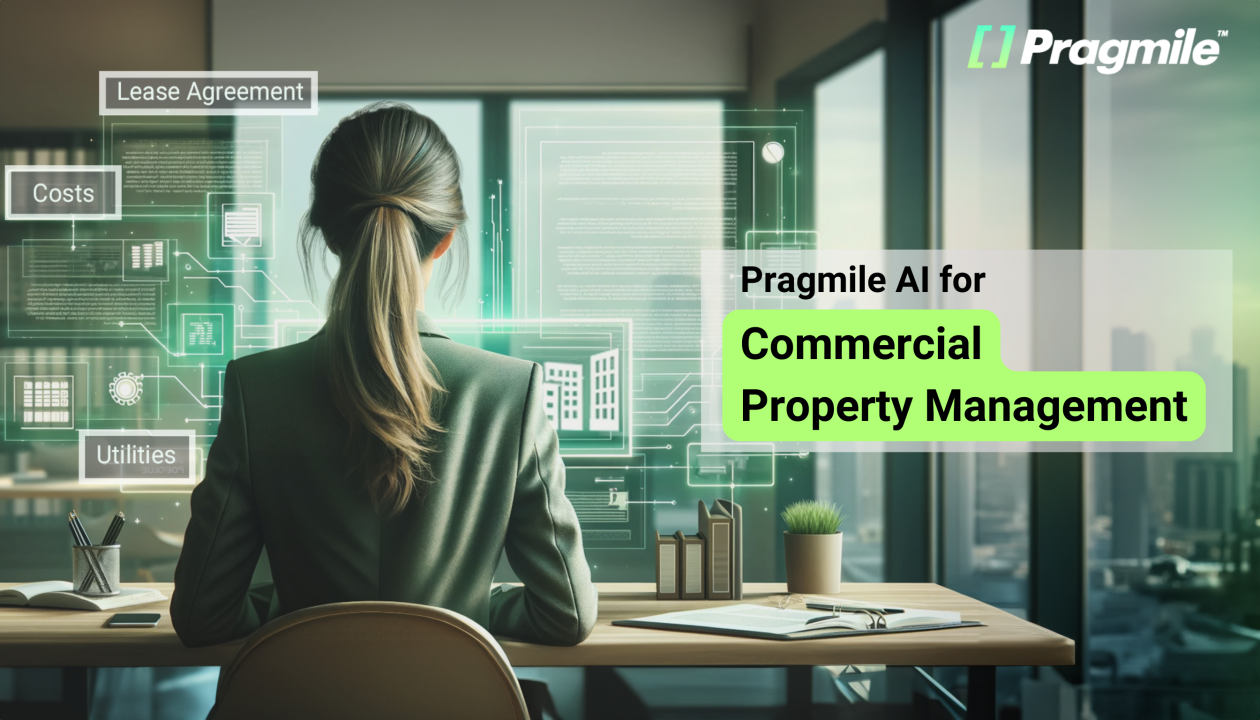
Date published: April 4, 2024
Optimizing Commercial Property Management with AI: A Case for Efficiency and Cost Reduction
What do we know about commercial property management? The process completely relies on spreadsheets, manual actions, and human intuition to manage properties and deal with lease agreements.
However, all commercial properties, regardless of their size, often face challenges with said agreements. Each contract may contain unique clauses, terms, and conditions, requiring precision and attention to detail for accurate management, from invoicing to cost and utility calculations.
Traditional management often involves a team of specialists manually sifting through documents to extract key parameters for creating a legal document and putting them into other systems like accounting, invoicing, and reporting which is both time-consuming and prone to errors.
Luckily, artificial intelligence (AI) and the recent introduction of Large Language Models (LLMs) like ChatGPT has become a game-changer for commercial property management with a solution to streamline these processes, enhance efficiency, and reduce operational costs.
AI Solution for Commercial Property Management
Artificial intelligence (AI), specifically with the help of large language models (LLM), can help commercial operational teams to search, interpret and extract key information.
How does it work?
First, AI is implemented into the software to start extracting parameters based on your initial input – sorting through the text to identify relevant data points. It’s often a near-instant process that allows AI to analyze hundreds of lease agreements and identify the necessary information.
However, sometimes, AI may encounter unclear, ambiguous, or complex clauses. In this case, AI marks these documents for a human specialist to review. Most companies combine AI with human experience. This hybrid process creates a feedback loop, where the human-reviewed data trains AI over time to improve its handling of more complex clauses.
Benefits of AI Integration
AI has only recently slipped into all industries and how people do business, but its advantages have been impressive. Integrating AI into commercial property management offers you the following:
- Easier lease agreement management: Traditional lease agreements, especially those with unique terms, are time-consuming to review and process. AI automates their analysis and helps extract the set parameters, speeding the process and reducing the potential for human error. For large property firms, this could mean saving hundreds of hours yearly on lease management tasks alone.
- Cost-efficiency: By reducing the human team from 20 specialists to just one AI platform and an expert who will review complex cases, companies can also cut their operational costs by as much as 90%.
- Near to no errors: Manual document processing typically has an error rate of 5-10%, depending on the complexity of the task. When you train AI to better understand your company’s complexity, the error rate can be reduced to less than 1%, lowering the risk of costly mistakes in lease management.
- Improved decision-making: With analytics capabilities and automating routine tasks, AI can help property managers get more management insights, set optimal pricing strategies, and even influence negotiation processes.
- Client satisfaction: Because automated and customized lease document management speeds up the process of signing and modifying the agreements, implementing AI solutions can help increase client satisfaction rates.
Potential Tools and Technologies
The global AI market in real estate is projected to reach USD 731.59 Billion in 2028. And it’s obvious – the demand for more efficient property management solutions has never been higher. Luckily, with the various tools and technologies available on the market, commercial property managers can obtain a competitive advantage over companies that still use the human approach only. Here are some of the best AI tools and technologies:
- ChatGPT – a tool for understanding, analyzing, and extracting information from text. However, the demands of commercial property management often necessitate AI models tailored specifically for this niche.
- LeaseLens – a tool for extracting key information from lease documents with the help of ML and natural language.
- ValPal.ai – software for detailed property description generation from input data to market new properties faster.
- Pragmile AI solution – adaptable AI software for classification and analysis documentation. Commercial real estate firms can use Pragmile to customize the output and train the software on sector-specific terminology and contractual nuances to ensure precise results.
Implementation and Integration
Today, companies can start implementing AI to analyze their lease contracts with minimal initial investment, allowing them to reap benefits faster and obtain their return on investment (ROI) more rapidly. Here’s how you can integrate AI into your commercial property management system:
- Evaluate how lease agreements are currently managed at your company and identify what areas need improvement the most (for instance, document analysis, compliance checking, or data extraction).
- Choose an AI tool that corresponds to your previously identified needs (we’ve mentioned some of the most popular AI tools above). Consider tools that can be customized and scalable, such as the Pragmile AI solution, to fit the specific terminologies used in your lease documents.
- Prepare your data. AI tools need digital data to analyze and extract data, so make sure you have all your lease documents in a digital format. It could also be useful to categorize leases by tenant, date, or type to allow faster data processing.
- Integrate AI software. Most AI tools offer Application Programming Interfaces (APIs) that can be easily integrated with existing property management systems.
- Try to do a test run with a set of documents to see how well the AI tool understands and analyzes the data. You may need to train the AI on your specific lease agreements – giving the system example documents and correcting its outputs to improve accuracy.
- Once you’re satisfied with the tool you’ve chosen, try using it on your entire portfolio of documents.
- To ensure your AI tool works the best and avoids stalls when complex cases appear, make sure to have a specialist monitor and review the data after the AI, adjusting the parameters to better fit your needs.
Conclusion
The integration of AI into commercial property management means only one thing – efficiency. Cost efficiency, faster results, and error-free outcomes – all these benefits make it an incredibly attractive proposition for any business looking to optimize its operations. Contact Marcin Jabłonowski directly and let’s implement an AI solution to transform the way you do business.
Schedule a free consultation with
our AI and technology experts
Take advantage of the latest AI solutions, tailored to your company's needs. Book a consultation with AI solution architects at Pragmile and discover new opportunities in energy management.
Please, provide your business email to schedule a meeting


